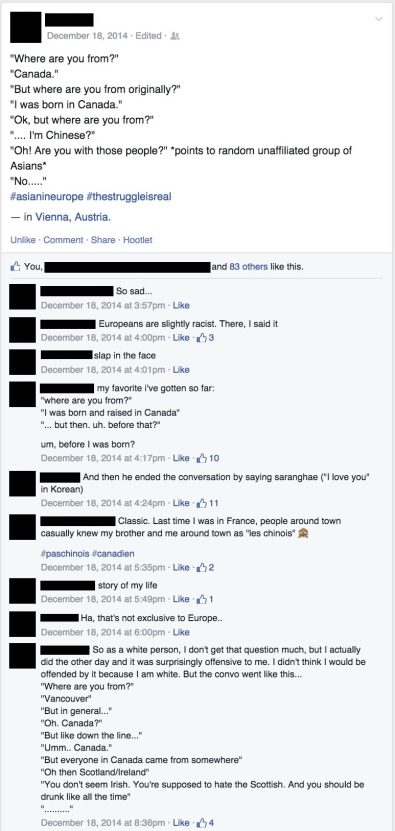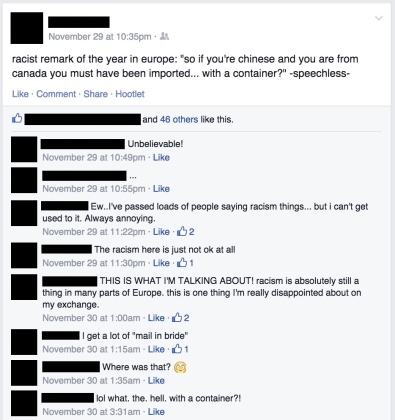I’ve said it a million times, but I can’t believe exchange is actually over. I must say, I had some of the best times of my life during this experience and I met some of the most driven, interesting, and fun people ever. It zoomed by in a blur, but I’m glad I took photos and blogged to remind me of all the great things that happened over the past four months.
I definitely grew as a person throughout this wonderful experience. I learned so much about myself: how I function, how I like to spend my free time, who I prefer to surround myself with, and more. I learned to be more open, especially when meeting and hanging out with new people, and I learned to be patient with others.
I loved being able to meet people from different parts of the world, as well as travelling to several countries to learn about various cultures & languages. That was one thing I found astonishing about Europe: countries in such close proximity still maintain very strong cultural distinction, national traditions, and language. I suppose that goes for many other areas of the world: Africa, South East Asia, Latin America. It makes me feel so boring as a North American, where Canadians and Americans can easily get lumped together as one.
Here’s my first big cultural observation: it’s not about the Viennese or Europeans at all. In fact, it’s about our friendly neighbours… the Americans. Now, I must disclaim that I don’t hate Americans, nor do I condone racism or discrimination. Americans and Canadians love to make fun of each other all in good spirits, but here’s simply an observation I made about our fellow friends down south. During our very first day of orientation, we met all the members of our orientation group. Everyone began introducing themselves, stating their name, where they’re from, what they’re studying, etc. Mostly everyone would say their country, for example: “I’m from Russia”, “I’m from Spain”, etc. BUT, I noticed that every single American would say the state or city they were from, as if everyone was expected to know the USA in and out. A common stereotype is that Americans believe they’re the centre of the world, knowing nothing about other countries. The fact that some of our American counterparts stated they were from “Minnesota” or “New Orleans” seems to reinforce the stereotype. If a Russian were to say that they’re from Yekaterinburg, or a Spaniard to say that they’re from Seville, I doubt the American would know where those international cities are! Again, I’m not trying to be racist or discriminatory, it is just an observation I made.
On the topic of racism… I’m just going to come out and say it: I think Europeans are a bit racist. Maybe more than a bit. I have a few examples which reinforce my point:
- Second-class citizens
- In many parts of the world, there are “second-class citizens”. This includes Europe – many of the European second-class citizens come from Eastern Europe, Turkey, and surrounding countries. In Vienna, I noticed a strong divide between the “regular” Viennese and the Turkish population living in Vienna. One of my Viennese friends even said: “We like the Chinese and the Indians because they come to Austria and work hard and contribute to our economy. But the Turkish people, when they come, they don’t work. They live off the social welfare and don’t contribute to the society here.” Hearing my Viennese friend say this was surprising to me, because I’ve always been used to a very “open-arms” stance on immigration growing up in Canada. In fact, if it weren’t for the welcoming Canadian attitude towards immigration, my family probably would have suffered a lot more discrimination in “the West”.
- Update: The recent Canadian Bill C-24 was passed and people can have their Canadian citizenship revoked at any time (including family members) for a number of reasons, including: obtaining the citizenship by false representation or fraud, having served in a military that was in armed conflict with Canada, conviction of (high) treason, spying, or sentenced to imprisonment for life, or terrorism offences as well as sentence to at least five years’ imprisonment. Historically, Canada has never had any similar laws and has prided itself on its welcoming immigration policies. The controversy comes from the fact that most cases will be dealt with procedurally by the citizen and immigration minister, rather than a “fair trial” by a Federal Court judge. Overall, I think the stripping of one’s Canadian citizenship is justified for the above fraudulent or terrorist-related reasons, but it’s very “un-Canadian” to start thinking of certain people as second-class citizens.
- “Cat calling” in the streets
- What I mean by “cat calling” doesn’t refer to anything sexual, but I actually had it happen to me multiple times where I was walking in the streets of Vienna and someone (usually a man) would shout at me, “Ni hao! Ching chong ling long!” or other Asian-sounding gibberish. The first time this happened, I was appalled. I wasn’t sure whether it was because of the cat calling itself, or whether my subconscious associates negatively with being Asian, or what else. But after thinking about it a little more, I realized my discomfort probably originated from the fact that I was being judged or categorized without further investigation. I would think, “Do they think I’m from China? How do they even know I’m able to speak that language? They don’t know me! They don’t know my story!” Like most people, I don’t really enjoy being stereotyped or categorized without further inquiry. At first, I thought, “Maybe these people are just trying to understand me because they see that I’m Asian.” But what I realized was that people who were catcalling weren’t intending to get to know me at all, they were just being rude. At least in my view they were.
- It’s not just me
- Many of my friends from UBC also went on exchange in Europe, and most of them also experienced some kind of racist remark while travelling. Below are some examples:
Final thoughts: You’d think that after horrific events like WWII and other world genocides perpetrated by Europeans, that people would learn…. But what I’ve experienced in Europe indicates otherwise. Why does this still happen today? Why, in an educated and worldly society (Europe), is there still blatant racism or judgment? One reason I can think of involves the mosaic of European cultures: each European country seems so ingrained in their own culture and is proud of being different from their neighbours that they can’t help but stereotype “the French”, “the Belgian”, “the Italians”. If you mistook a German for an Austrian, or a Spaniard for a Portuguese, boy would they give you a hard time about it. I think many Europeans are “trained” this way since childhood, and it trickles into adult life. Now, I don’t mean to say that ALL Europeans are racist. In fact, I met many who are totally non-judgmental and love interacting with people at “face value”. But after returning to my culturally diverse hometown, it’s undeniable to me that non-white people in Europe are treated differently. End rant.
Over the last four months, there have been highs and lows, but I’d say the entire experience was 95% positive. While writing this post, I attempted to summarize my Top 10 favourite moments of exchange, but I realized that was practically impossible. Of all the things I did and the places I went, I wouldn’t have changed any of it. And as I’ve been reiterating for several posts now, it’s not necessary what you do or where you go. It’s really about the people you’re with that make the experience either mediocre or fantastic. I met so many people who I know will go far and make big things happen, and I made so many great friends that I know I’ll cherish for life. Hands down, I would recommend everybody to go on an exchange semester. No matter what your motives are for going, I can guarantee you won’t regret it.
And now…. I must plan for my next adventure! 😉

